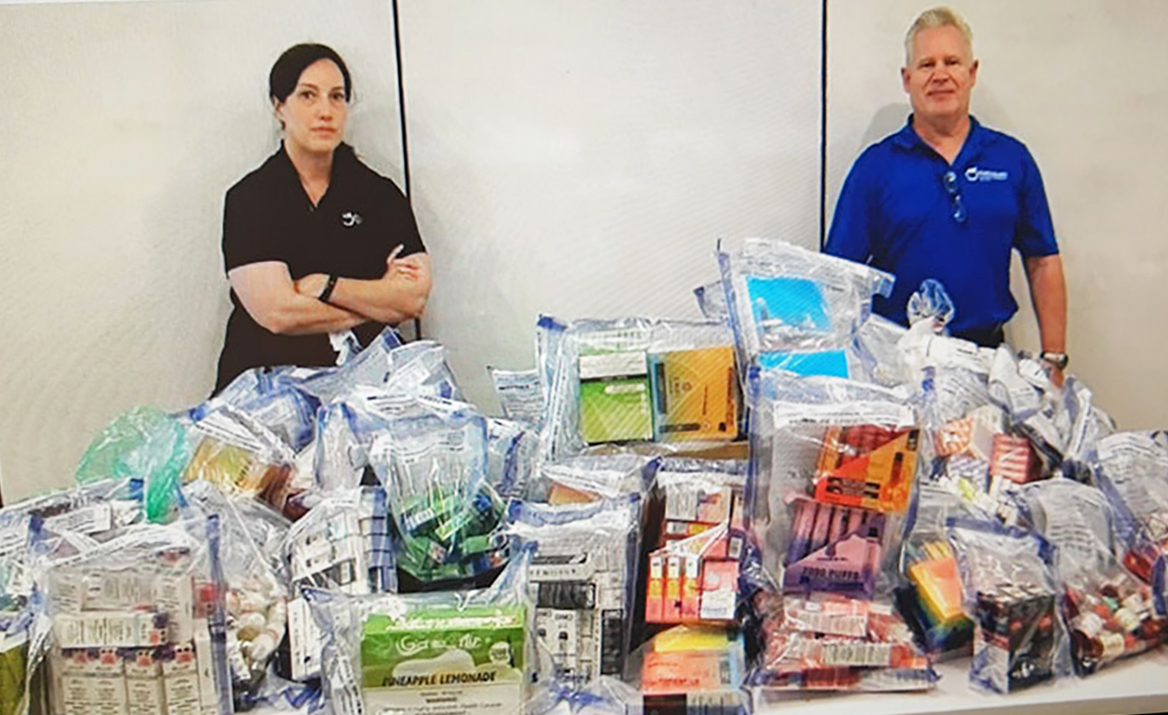GUELPH – Vaping is becoming a greater concern than smoking among youth for Wellington-Dufferin-Guelph Public Health (WDGPH) officials.
That was highlighted in reports to the WDGPH board on Dec. 6.
And public health is scrambling to keep up with the new ways tobacco companies are trying to market nicotine products.
“Essentially what Health Canada has approved is something called a nicotine pouch,” Medical Officer of Health Dr. Nicola Mercer told the board.
“It’s labeled as a health product, so it’s not under the drug or under the pharmaceutical regulations.”
Because of that, anybody can buy it, including an eight-year-old, Mercer said.
The pouch works like chewing tobacco. The pouch is placed in the cheek and nicotine is absorbed into the blood stream, making it highly addictive and very difficult to detect, she said.
It’s intended to be a smoking cessation product, but public health is finding that youth are using it and becoming addicted.
Phil Wong, manager of environmental health, said public health had a good record with inspections of convenience stores and charging those who sold tobacco to minors.
But over the pandemic, those inspections ceased as public health staff were all deployed to pandemic duties.
Now that they’re back, Wong said the number of vape stores (vape or vapour products are also called e-cigarettes) has increased exponentially.
“In 2018, there were less than 100 vape retailers, mainly convenience stores and gas stations” in the WDGPH region, Wong states in his report.
“This number doubled in five years, with Tobacco Enforcement Officers and Public Health Inspectors inspecting over 200 retail facilities in 2023.”
Wong noted an increase in specialty vape stores, “with roughly six that would meet the definition in 2018, to close to 40 in 2023, which require annual licensing and registration from the inspection team.”
Close to $45,000 of illegal nicotine products were seized from January to August this year, he said, adding they also issued six times the number of notices of violation and charges over the previous five years combined.
Wong said since e-cigarettes became legal in 2018, there has been a noticeable increase in usage.
In 2017, just over 600,000 Canadians surveyed reported using electronic cigarettes; in 2022, the number exceeded 1.8 million.
He said public health received more complaints, referrals and requests regarding tobacco and vaping in 2023 than the last five years combined.
And much of that concern is about vape stores being close to schools.
Wong said statistics indicate a 30 per cent increase in vaping among youth and they can buy products easily.
He said 100% of the secondary schools inspected in 2023 reported having issues with youth vaping on school property, prompting the development of an online reporting tool for administrators and increasing the presence of enforcement officers in schools.
Wong said targeted enforcement initiatives are occurring in fall 2023 and into winter 2024 targeting all tobacco and vape product retailers within walking distance of schools in the WDGPH region.
“An online diversion program is set to be launched in winter 2024 as part of the [WDGPH] Learning Management System portal,” he stated in his report.
The program, developed with school boards, will provide education to youth caught vaping or smoking tobacco on school grounds.
“Going forward, a continued collaborative approach with enforcement and health promotion partners within our community will be required to allow [WDGPH] to redirect resources to higher-risk populations such as youth,” Wong wrote.
“This is actually really serious,” Mercer added. “Nicotine is really addictive and (tobacco companies) are targeting youth. Now they don’t have to smoke to become addicted.”
Mercer urged parents to talk with their kids about the dangers of vaping, smoking and other ways of consuming nicotine.
“If they’re not vaping, their friends are,” she said. “And it can happen without anybody knowing.”
Mercer said the problem is that public health doesn’t have the authority to remove licences – only to issue fines to businesses that don’t comply with the Smoke-Free Ontario Act (2017).
And the act doesn’t cover the new nicotine pouch product on the market.
Mercer said the Association of Local Public Health Agencies has written to the federal government advocating for legislative changes.
“There’s a big hole,” she said. “If an eight-year-old can buy it, something is wrong.”



